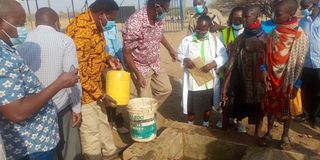Sh750m mega dams in northern counties to reduce water scarcity

Devolution Cabinet Secretary Eugene Wamalwa (holding a jerrycan) accompanied by Turkana County government officials led by Deputy Governor Peter Lotethiro at Lokiriamet village to commission a water project for borderland locals near the border of Kenya and Uganda.
The State has invested Sh750 million into the ongoing construction of mega dams in West Pokot, Turkana and Marsabit counties in efforts to address sustained scarcity of water along the Kenyan border with Uganda and Ethiopia.
Devolution Cabinet Secretary Eugene Wamalwa said that the dams that are earmarked for completion by September this year will be banked on as a solution to resource based conflicts when Kenyan herders cross over to neighbouring countries in search of water as a result of the frequent drought.
Mr Wamalwa said that the national government is spending Sh250 Million on each dam.
The dam in Turkana is located in Loima sub-county and will be relied on to conclusively solve water shortage and end reliance of Turkana pastoralists on a similar Kobebe Dam in Northern Uganda.
"Pastoralists at borderlands identified water shortage as their biggest problem that is exposing them to armed conflicts and killings when dry spells force them to cross over to neighbouring countries," the CS said.
He challenged contractors working on the three dams to stick to the completion deadlines.
"The dams are part of the goodies that came in September 2019 when Kenya and Uganda signed the historic Cross-Border Programme for Sustainable Peace and Development deal at Moroto in Uganda witnessed by the two heads of State to develop the marginalized Turkana-Pokot-Karamoja region." Mr Wamalwa said.
He said that already two water scarce villages in Turkana County have gained access to water after the national and county governments partnered with development agencies to develop the Sh16.5 Million Urum water reticulation and another solar powered borehole at Lokiriamet village.
At same time, the CS lauded the recently launched United Nations Development Programme (UNDP) Africa Borderlands Centre (ABC) that will promote integration and unearth economic potential of marginalized, fragile and impoverished borderlands regions that include the Turkana-Pokot-Karamoja region.
He said that the country is already on the right track in opening up border regions that are characterized by armed conflicts over livestock and resources by embracing innovative, comprehensive and integrated cross-border programmes with Uganda and Ethiopia.
He noted that through research, the centre is expected to utilize top notch and innovative approaches to pilot or test creative ideas from borderland communities themselves and to utilize their home grown solutions to develop a new model of development practice.
According to UNDP, communities at the Horn of Africa (easternmost projection of the African continent), Sahel (semi-arid region of western and north- central Africa extending from Senegal eastward to Sudan), The Lake Chad Basin that is located in Northern Central Africa, and Great Lakes Region of Africa, have suffered many years of marginalization and neglect from successive governments and development partners.
Ms Ahhuna Eziakonwa, Director at the Regional Bureau of Africa (UNDP) said that the journey towards globalizing the voices of Africans at the borderlands has started with the newly inaugurated centre that will be based in Nairobi, Kenya.
She pointed out that the borderland areas are adversely affected by climate change which has increased the struggle for scarce resources leading to conflicts and forced migration.
Mr. Walid Badawi, United Nations Development Programme (UNDP) Kenya Resident Representative on his part said that residents at borderlands areas will be supported to devise innovative ways of solving their own development challenges whether it is agriculture in arid areas or environmental friendly energy systems to address day to day problems.
Turkana Governor Josphat Nanok said that his administration has been participating in mass livestock treatment and vaccination targeting pastoralists in Kenya and Uganda who live along the marginalized Turkana- Pokot- Karamoja corridor.





